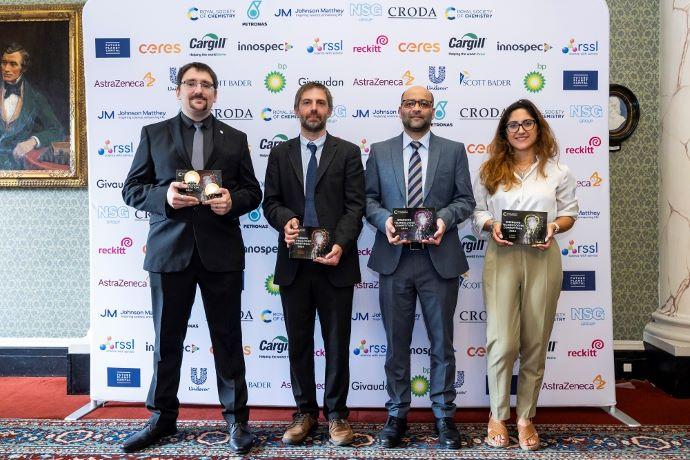- H2Upgrade is one of four winners to share a £100,000 prize pot and industry leading support to commercialise their technology
- The winning scientists from the University of Cambridge have developed an exciting technology to convert industrial wastes into high-purity hydrogen
It was one of four groundbreaking ideas crowned as winners last week at the Royal Society of Chemistry’s iconic Burlington House headquarters in London after a nail biting final:
- University of Cambridge – Energy Category: H2Upgrade is a new technology which converts valueless industrial wastes into high-purity hydrogen, enabling the waste-producing companies to become hydrogen producers and consumers, while promoting the hydrogen economy and distributed manufacturing.
- ThioTech Ltd. – Environment category: The technology removes toxic metal residues from water, oil and gas using next-generation absorbents made from the abundant and low-cost industrial waste product elemental sulfur, thereby preventing environmental release and contamination.
- Ignota Labs – Health category: Ignota Labs has developed a novel AI platform to understand the root causes of safety problems in drug discovery by combining Deep Learning models, to predict how the drug interacts with the body, with algorithms over complex data, to understand the biological impact of those interactions and enable drug failure turnaround.
- Imperial College London – Enabling Technologies Category: Imperial College London wowed judges with its innovative solid-phase peptide synthesis, which promises to significantly boost the productivity of existing peptide analogues and facilitate the synthesis of first-in-class analogue for the greater availability of oral peptide therapies.
To achieve this accolade, the finalists had to convince a panel of industry heavyweights from some of the most prominent companies in the world that their innovations could tackle societal, environmental and economic challenges facing the world today, while also delivering their planned approach to commercialisation.
The winners share £100,000 of no strings funding and invaluable publicity to accelerate and grow their businesses.
Dr Helen Pain, CEO of the Royal Society of Chemistry, said: “For over a decade our Emerging Technologies Competition has celebrated the very best of chemical science innovation, while catapulting exciting ideas towards commercialisation.
“Since then, we’ve been blown away by the level of entries from entrepreneurs across the UK. Addressing everything from air quality to antimicrobial resistance, our chemists are truly working at the cutting edge and playing a vital role in tackling societal challenges, supporting a sustainable future and driving economic growth.
“I was pleased to attend a closely fought competition this year and I would like to personally congratulate all the winners and finalists on their success. Previous winners have gone on to raise millions of pounds in equity investment and grant funding, and I cannot wait to watch our 2024 winners go from strength to strength.”
Held on 4 July, 24 finalists came together in London to pitch in person for the competition final. The internationally renowned panel of judges included representation from organisations such as Unilever and Johnson Matthey. After an initial application process, finalists were invited to pitch their innovations to the panel before winners were decided.
The competition showcases some of the most promising chemistry applications across four core categories. This year, entrants represented a range of proposals from tech innovators, start-ups and spin outs.
Professor Stuart Scott of the University of Cambridge and H2Upgrade, winner of Energy category, said: “The prize money is obviously a big help to us - we'll be using that to help us incorporate as a business, do more micro-research and help us find partners - but I think as well, there's the recognition. This gives us an opportunity to go out, get some traction and really speak to new partners and build the company. It's really great to win this award.”
Liam Dodd, Chief Operating Officer at ThioTech Ltd and winner of Environment category said: “The competition was really stiff, everybody in there deserved it, and I'm really honoured and also emboldened to see that finally a panel of true experts value the technology as much as we do. It's incredible, and that really gives us the motivation to go forward.”
Layla Hosseini-Gerami of Ignota Labs, winner of the Health category, said: “We're currently raising our seed round so being able to tell investors that we've won such a prestigious award from this institution is definitely going to help us along our way and really give that validation that we need.”
Dr Othman Almusaimi of Imperial College London and Orthogonal Peptides, winner of Enabling Technologies category, said: “It's a very nice recognition from a prestigious institution like the Royal Society of Chemistry. It's actually kind of a push and we feel that we are doing really well, so we are very happy with this kind of recognition.”
The competition provides a unique platform for innovators to engage with and learn from these large multinational partners and judges to raise awareness and gain industry validation for their innovations.
Since the Emerging Technologies Competition began in 2013, 68 winners have gone on to raise over £200 million in equity investment and grant funding. One winner has since been acquired for £28 million, while other winners have expanded overseas, entered commercial contracts and conducted clinical and industrial scale trials.
The Emerging Technologies Competition is supported by the following partners:
- AstraZeneca
- bp
- Cargill
- Ceres
- Croda
- Future Planet Capital
- Givaudan
- Innospec
- Johnson Matthey
- NSG Group
- PETRONAS
- Reckitt
- RSSL
- Scott Bader
- Unilever
For more information, please visit rsc.org/competitions/emerging-technologies.

